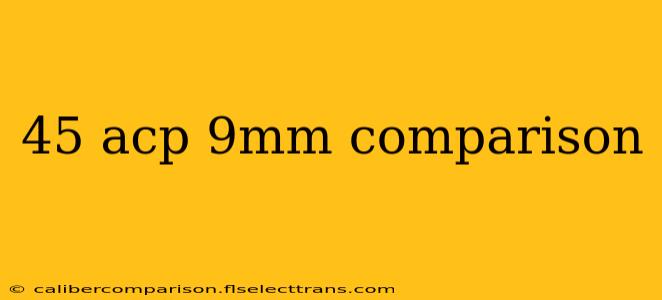Choosing the right cartridge for self-defense or target shooting can be a daunting task, especially when comparing popular calibers like the .45 ACP and 9mm. Both have ardent supporters, each claiming superiority. This in-depth comparison will delve into the key differences between the .45 ACP and 9mm, examining factors like stopping power, recoil, capacity, and cost to help you make an informed decision.
Stopping Power: The Great Debate
The age-old question: which round stops an attacker faster? The answer isn't straightforward. While the .45 ACP boasts a larger diameter and heavier bullet, resulting in significantly more energy transferred upon impact, the 9mm's higher velocity and improved ammunition technology are closing the gap.
-
.45 ACP: Its larger diameter creates a wider wound channel, potentially leading to more immediate incapacitation. The massive bullet diameter is its main claim to fame regarding stopping power. Historically, this was considered a significant advantage.
-
9mm: Modern 9mm ammunition, featuring jacketed hollow points (JHPs) designed for expansion and penetration, often exhibits comparable stopping power to the .45 ACP in real-world scenarios. The higher velocity contributes to deeper penetration, and the smaller caliber generally allows for higher magazine capacity.
Ultimately, the effectiveness of either cartridge heavily relies on shot placement. A well-placed 9mm shot will be far more effective than a poorly placed .45 ACP shot. The focus should always be on accurate shot placement, regardless of caliber.
Recoil and Shootability: Comfort and Control
Recoil is a significant factor, particularly for those new to firearms or those with less upper body strength.
-
.45 ACP: Known for its substantial recoil, the .45 ACP can be challenging for some shooters, especially during rapid fire. This heavier recoil can lead to slower follow-up shots and decreased accuracy.
-
9mm: Generally considered more manageable, the 9mm exhibits significantly less recoil, making it easier to control and shoot accurately, even in rapid succession. This translates to faster target acquisition and improved accuracy, particularly in stressful situations.
Magazine Capacity: Rounds on Target
Magazine capacity plays a crucial role in self-defense scenarios.
-
.45 ACP: Typically holds fewer rounds than a 9mm pistol of similar size. This means fewer shots available before needing a reload.
-
9mm: Offers significantly higher magazine capacities, allowing for more shots before reloading. This advantage is particularly relevant in self-defense scenarios where multiple attackers might be involved.
Cost: Ammunition and Training
The cost of ammunition is a continuous consideration for any shooter.
-
.45 ACP: Generally more expensive than 9mm ammunition. This can impact the affordability of regular practice, which is crucial for maintaining proficiency.
-
9mm: Significantly more affordable than .45 ACP, making it a more cost-effective option for practice and training.
Conclusion: The Verdict Depends on Your Needs
There is no single "winner" in the .45 ACP vs. 9mm debate. The best choice depends entirely on individual needs and priorities. Consider the following:
- Experience Level: Beginners might find the 9mm easier to manage due to its lower recoil.
- Intended Use: Self-defense scenarios might benefit from the higher capacity of the 9mm, while target shooting may prioritize the accuracy and controlled recoil offered by either caliber, depending on shooter preference.
- Physical Capabilities: Individuals with less upper body strength may prefer the lower recoil of the 9mm.
- Budget: The cost of ammunition is a significant factor, and 9mm is generally more affordable.
Ultimately, the best way to decide is to rent or borrow both calibers and try them out at a shooting range. This hands-on experience will provide the best insight into which cartridge suits your individual needs and shooting style. Remember, responsible gun ownership includes thorough training and understanding of firearm safety.

